Meeting Raj Begum
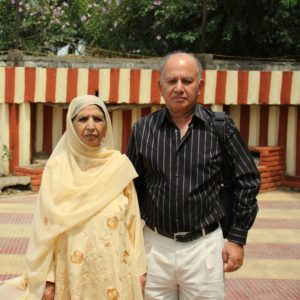
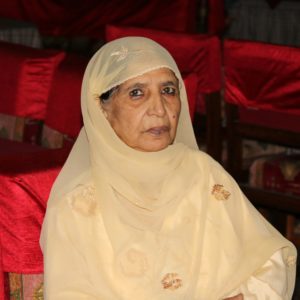
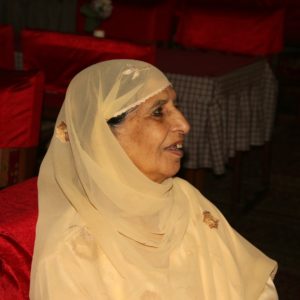
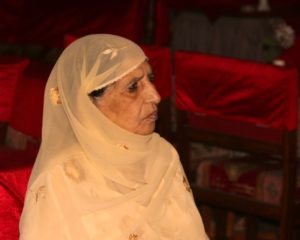
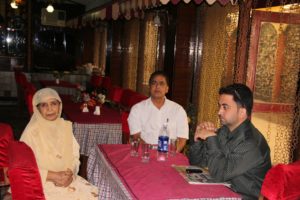
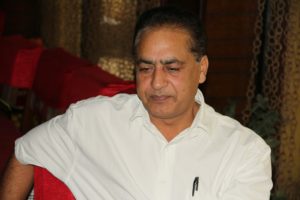
I took these photos of Raj Begum and others on Aug. 13, 2011, at a restaurant at Dal Gate, Srinagar, Kashmir. Following are the descriptions, from the top:
1: Raj Begum and me.
2,3,4: Raj Begum
5: Irshad Lone (Raj Begum’s grandson), me, and Rehmatullah Khan ( a friend of Raj Begum and me).
6: Rehmatullah Khan.
It was sometime in early 70s when I was paddling through the back waters of my life that I realized that I liked Raj Begum’s singing very much. It was her deep drilling, haunting voice that captured my imagination. There were other good singers but none had the sorrowful, almost a mournful, and poignant voice that Raj Begum had.
I used to listen to her occasionally on radio when I lived in Kashmir, but now I wanted to listen to her extensively. But where to get her music, as it was not sold anywhere? So, I started the search for Raj Begum’s music, which lasted over several years.
On my three different visits to India in 70s, I met different people in Srinagar, who I thought might help me obtain Raj Begum’s music. In one of the trips I carried a bottle of Johnnie Walker whiskey from U.S. to be used as a bribe to get my goodies. But even that failed to do the job, as in all the cases I would be given a cassette of her music, which when played back home in New York, would deliver at the most one or two of her songs. I was frustrated and disheartened and was about to throw in my towel. But before I did so an idea flashed to me: why don’t I write to my uncle, who until recently used to hold an I.G.P’s position in the Jammu and Kashmir government. The rationale was that because of his high-level position his network of contacts ought to deliver the cat. I wrote to him in 1988 and lo and behold within two months I had a cassette filled with 93 minutes of songs of Raj Begum. I was ecstatic beyond ordinary experience; an inner joy seemed to glow through my mind.
At the heel of this stunning success, within a year a relative travelling from India on a business visit to New York met me. He worked for All India Radio, New Delhi, but previously had worked for Radio Kashmir, in Srinagar. I told him that by virtue of his connections with his previous posting, he ought to be able to get me more of Raj Begum’s music for me, as obviously the great singer had sung many hundreds of songs. My relative felt challenged, especially because my uncle, who was his relative too, had an achievement to his credit in this field. My relative accepted the challenge and I handed him the highest quality cassette I could buy. But, in spite of his bravado to accept the challenge, I had doubts about his ability to deliver the goods; the reason being that he was a very busy bureaucrat. But a miracle did happen, as within six weeks I got another 80 minutes of songs of Raj Begum.
Now I possessed 2 hours and 45 minutes of songs of Raj Begum; so I was in the company of a select group of lucky people. People measure their fortunes in money, but I measured it by the number of Raj Begum’s songs that I possessed.
I made many copies of my booty and generously gave it away to my friends. But I realized that every Kashmiri should have access to all of Raj Begum’s music, which was much more than 2 hours and 45 minutes of songs, but which was not available, because of a special situation. When Raj Begum started singing professionally, in mid-50s, only radio stations had recording equipment. Her best years of singing were spent working for Radio Kashmir, with the result that her entire music is only available through it. Having the mentality of a Government of India department, Radio Kashmir did not think it was their business to release a singer’s music to public, even if the singer was of as high a caliber and legendary as Raj Begum was.
So, I launched a project to make Raj Begum’s music accessible to people. I sought the help of my friend Kailash Mehra, a renowned Kashmiri singer. She approached a deputy director of Radio Kashmir about the project but met discouragement. I thought of getting the help of Farooq Abdullah, a former chief minister of Jammu and Kashmir, and now a central government minister, who is an ardent lover and supporter of Kashmir music. But this also fizzled out due to practical difficulties.
In 2011 I had an awesome chance to speak to the director Radio Kashmir and meet Raj Begum, as I went on a trip to Kashmir in August. It looked like too good to be true. But I had to try to achieve both the items to the best of my abilities. Due to Kailash Mehra’s help I met Rehmatullah Khan, a well-known singer and a senior artist of Radio Kashmir, and the son of the renowned music composer Nassarullah Khan. He arranged my meetings with Raj Begum and the director of Radio Kashmir.
I waited with an excited expectation and keen eagerness for Raj Begum’s arrival for lunch outside Shamiyana restaurant, at Dal Gate, Srinagar, on August 13. Almost exactly at 2:00 P.M. she arrived in an auto-rickshaw. She stepped out of the auto with measured though delicate steps. I approached her with joyful trepidation. She waited for me to come to her and though standing toward me she seemed to be looking at nothing. She was of small build, slim, and composed. Her face was age-beaten but poised. She seemed to have seen a million tragedies but having refused to be blown off the ground. A patina of time skinned her face. With a torrent of thoughts gushing through me I just managed to greet her. She reciprocated with a dignified movement of her body. A young man escorting her I was later told was her grandson Irshad Lone. Soon Rehmatullah Khann joined us. Getting into the restaurant we were told, in a comic turn of the event, that it was closed for the afternoon due to some reason.
We went to another restaurant at Dal Gate, just a half-mile away. We started talking about the old times, 50s and 60s. Raj Begum recited many names in the music world of that era. When I asked her if Farooq Abdullah was an ardent lover of Kashmiri music, she replied that Bakshi Gulam Mohammed was much more so. Soon Rehmatullah told her that it would be a good idea for her to record some songs for me. I was taken aback by it as I had never thought of that. To my utter surprise she excitedly agreed to it. Now Rehmatullah started discussing with her which should be the ten songs she would sing. At this a burst of enthusiasm took hold of her. She started humming lines of songs. The meeting lasted an hour.
The first day of recording was set for August 19 at Zee Studio, At Residency Road. She was escorted this time by her son Mohammad Ramzan. Rehmatullah and she started going through the motions of setting up the tunes of the songs. She sang in a deliberate, though practiced, manner. Her song-laden voice came from deep within her, her hand-gesturing only giving it an after-delivery confirmation. Her delivery was smooth, without an apparent effort. She seemed not to need much musical instrument support for her singing. Here I was seeing the performance of the greatest Kashmiri singer that I knew of. It was an ecstatically dramatic moment for me. What more did I want in life, I thought?
During the recording break I engaged her in a conversation. I asked her at what age did she tell her family that she was going to be a professional singer. She told me that it was 21. I asked her this question because in the days of her youth singing was considered to be a low-level profession, more so for women, who would be taken to be of low moral caliber. I further asked her what difficulties she faced in the society because of her profession. She told me that her husband forbade her to sing publically. But after a show of rage about it he let her sing. She also told me that the renowned ghazal singer Begum Akhtar told her to switch to ghazal singing.
Further conversation with her elicited that though she had been bestowed a thousand awards but was hardly rewarded monetarily. I learned furthermore from other sources that she was poor, as the sole source of her income before her retirement had been the Radio Kashmir salary, which is so meager that it is a cruel joke. Here we have the greatest singer of Kashmir having difficulty making two ends meet. In Kashmir artists do not amount to much in public estimation. They cannot make a living on their artistic work. Any nation that does not value its artists is a backward nation, as art uplifts the human soul equal in caliber to religion.
At the end of the first recording session she told me that she was going to resume her daily riyaaz. Obviously, meeting an ardent admirer of hers and recording her songs after an absence of some six years she was exultant, which gave a boost to her musical soul.
Next in line for me was to meet the director of Radio Kashmir Mr.Javied Iqbal. I explained to him why recordings of Raj Begum had to be made available to the public because (a) they were not available commercially and (b) because she was an outstanding artist, whose work brought joy to Kashmiris, especially the ones living in the countries far away from India, who would get home-sick easily. I told the director that the recordings should be released to me, so that I could inform the world-wide Kashmiri community of their availability, a task I presumed Radio Kashmir would not like to do itself. Any proceeds from the distribution of her music would be given to Radio Kashmir. In fact, I suggested that they should be rather given to Raj Begum, in light of her strained economic conditions. In case Radio Kashmir did not want to give me the recordings, they should make them available on a website. I told the director that diffusion and continuation of Kashmiri music such as Raj Begum’s songs must be a mission for Radio Kashmir, which is a preservation of the best of Kashmiri culture. He seemed to understand my points very well, and in that direction asked me to give him a letter stating my case. Which was eminently understandable to me in light of Indian government’s bureaucracy’s deep penchant for paperwork. Two days later the memorandum was delivered to him. Weeks melted into months, there was no response. At one point Rehmatullah indicated to me that based on some brief conversation he had with the director it seemed that the matter would be decided in my favor. But this good news did not convert to an official decision. When my friend again inquired about it, the director told him that he had already “released” Raj Begum’s previously recorded music, and since she did not professionally sing anymore he did not have to release anything. This statement was incomprehensible to me because if Raj Begum’s music had been released to the public, why wasn’t it available anywhere? It was an absurd statement made just to get out of the trap he found himself in. He didn’t have the decency to even reply to my letter. What killed my project was sheer Indian bureaucratic arrogance. So, Raj Begum’s music lies buried in the Radio Kashmir archives forever. So much love Kashmiris have for the arts and artists.
The second session of the recording on August 22 for the CD dedicated to me had to be cancelled on account of Raj Begum’s sickness. On August 23 I had to return to Delhi. Later on the recording was completed and the CD is now in its cover design stage. I have called the CD Songs From The Corners Of My Heart.
Raj Begum was born in a poor family of Magarbal Bagh, Srinagar, on March 27, 1927. Her father was Ghulam Rasool Sheikh. Like most of the great singers she started singing in her childhood. As she grew up she sang in marriage parties. It is only later in her life she received some formal training in singing, which came from the established musicians like Ustad Jhandee Khan, Ustad Muhammad Abdullah Tibetbakal, Ustad Muhammad Qaleenbaaf, and others.
Raj Begum was introduced to Radio Kashmir, Srinagar by the well-known folk singer Ghulam Qadir Langoo. She started her career there on July 16, 1954. Her unique voice and delivery of songs drew the attention of music lovers right away, especially her rendering of the famous love tale Gulrez. She went on to sing at Radio Kashmir till 1986.
She has sung in most of the genres of singing: folk, religious, ghazals, romantic, light, etc. It is difficult to estimate the number of songs she has sung as in the early days of Radio Kashmir it did not have recording equipment; a singer sang live. Often no paper records were kept. Some people familiar with the Kashmiri music scene estimate that she has sung a few thousand songs. Besides my estimation of Raj Begum to be the greatest Kashmiri singer of the modern times, it is also the popular opinion. The following songs of her have entered the Kashmiri folklore:
• Vyasiye gulan aavuy bahar
• Subuh phul bulbulav tul shore-googa
• Rum ghayam sheeshas byegur gov baane myon
• Wal az vyasiye dokh sukh mashrith sheraw loluk bagh
• Kyah roze pardan chaaye chaaye soze-jigar myon
She had the courage to break the social stigma of women singing in public, when she along with another great Kashmiri singer Naseem Akhtar, went to sing for Radio Kashmir. She was married to Qadir Ganderbali, who was a D.I.G. Police with the Jammu And Kashmir State when he passed away several years ago. She lives at Channapora, Srinagar.
Some of the notable awards she has won:
• Sadiq Memorial Award
• Robe Of Honor from Jammu And Kashmir Academy Of Art, Culture, And Languages
• Gold Medal For Best Concert In Kashmiri Folk Music by Jammu And Kashmir State
• Silver Shield by Kala Kendra
• Bakshi Memorial Committee award
• Certificate Of Excellence from Prasar Bharti (1999)
• Government Of Madhya Pradesh State Award (2004)
• Jammu And Kashmir State Excellence In Folk Music (2008)
• Jammu and Kashmir State Cultural Award Winner (Golden Jubilee, 2009)
. Sangeet Natak Academy Award
• Padma Shri (2002)
Since returning to New York I have been regularly in touch with her either directly or through her family members. She recently underwent a gall bladder removal surgery and seems to be recuperating well. Next year when I return to Kashmir I plan to meet her again, as she is as precious to me as Dal Lake is.
Suffern, New York, November 30, 2011; Rev. December 18, 2011; Rev: 2.21.21 www.kaulscorner.com; maharaj.kaul@yahoo.com